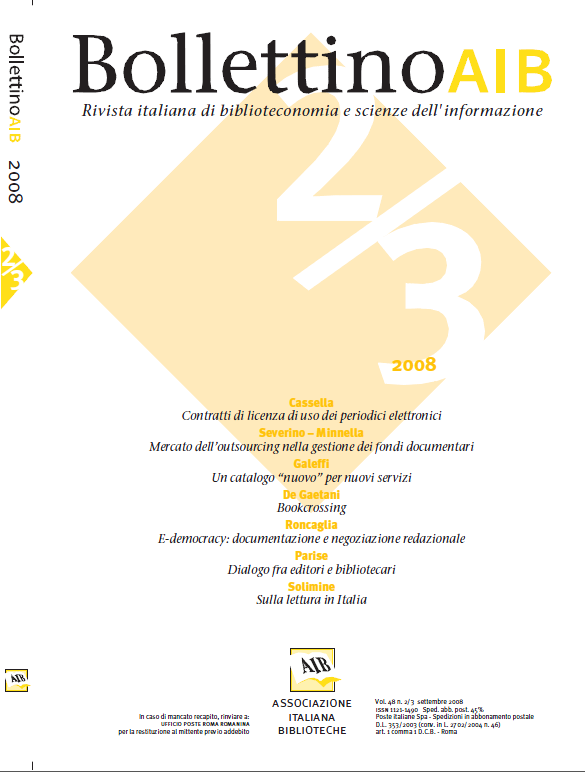E-democracy : the importance of documentation in editorial negotiation
Main Article Content
Abstract
In January 2007, within the sphere of a convention on documentation possibilities organized by the Roselli Institute of Turin, Roberto Casati and the author illustrated a proposal regarding the creation on the web of a tool for editorial negotiation for the joint drafting of prescriptive texts (and especially of legislative bills). In brief, the proposal foresees the use of a Wiki platform for drafting the text, accompanied by an open archive that is able to collect and make accessible the relevant documentation, and by a CMS (also a simple platform for blog management) for creating information and update pages. The Wiki platform should be enriched with specific aspects for the marking and export of the text in XML format used for the structured editing of legislative texts , through the integration of a network version of some tools of the xmLeges family.
The proposal comes from a double consideration In the first place, by now network tools permit an extremely effective long-distance cooperation even with regard to editorial negotiation and the drafting of complex texts. Although not the only resource that can be used in this context, Wiki technology has amply demonstrated in the field – through projects such as Wikipedia – its fundamental soundness for the management of forms of open and extended editorial negotiation; the possibilities of revert (return to a previous draft of the text) and of complete tracing of modifications allow both a diachronic view of the process of editorial negotiation and a reasonably effective management of phenomena such as vandalism; the chance to put a discussion page beside an editorial page guarantees explanation of the motivations at the basis of the modifications proposed to the text.
In the second place, in our opinion, the creation of effective forms of shared democracy requires specific attention to the point of documentary management and production, and the consequent availability of tools able to guarantee participants both the required strictness of the process of editorial negotiation (which is in the final analysis a discussional process, of which it is important to be able to explain, share and discuss all stages), and the chance to collect and make available a suitable, opportunely structured documentation.
The proposal comes from a double consideration In the first place, by now network tools permit an extremely effective long-distance cooperation even with regard to editorial negotiation and the drafting of complex texts. Although not the only resource that can be used in this context, Wiki technology has amply demonstrated in the field – through projects such as Wikipedia – its fundamental soundness for the management of forms of open and extended editorial negotiation; the possibilities of revert (return to a previous draft of the text) and of complete tracing of modifications allow both a diachronic view of the process of editorial negotiation and a reasonably effective management of phenomena such as vandalism; the chance to put a discussion page beside an editorial page guarantees explanation of the motivations at the basis of the modifications proposed to the text.
In the second place, in our opinion, the creation of effective forms of shared democracy requires specific attention to the point of documentary management and production, and the consequent availability of tools able to guarantee participants both the required strictness of the process of editorial negotiation (which is in the final analysis a discussional process, of which it is important to be able to explain, share and discuss all stages), and the chance to collect and make available a suitable, opportunely structured documentation.
Article Details
Section
Articles

This work is licensed under a Creative Commons Attribution-ShareAlike 4.0 International License.
